Good content can be subjective, yet there’s a clear list of criteria that helps us (and search engines) make that judgment:
- A good article is well researched
- A good article is readable:
- It has a well-defined clear structure that makes it easy to read
- It’s broken into short paragraphs and active-voice sentences that are easy to understand
- It has an introduction and a logical conclusion
- A good article is free of plagiarism (i.e. it’s not just about NOT copying someone’s words, but also NOT copying other writer’s idea without contributing anything new). A good article should convey the blogger’s unique ideas.
- A good article is either informative or entertaining (depending on its purpose). In both cases it also needs to be engaging and valuable (a reader feels like reading it or at least skimming through)
- Speaking of which, a good article should have a purpose (it should aim to do at least one of the following: educate, help solve a problem, distract from stressful thoughts, etc.)
Note: online writing is different from academic writing or writing fiction and the criteria can be different for the latter.
Now, to a digital content writer or a blogger an always-burning question is:
How to create a good article each time, even when I am too busy / stuck / stressed / etc.
If you write articles on a regular basis, you are probably familiar with the concept of writer’s block, and let me tell you, it’s not fun.
So how to write a good article every time you sit down to writing?
The purpose of this article is to offer one of the possible ways, but it has worked very well for me…
How to Write a Good Blog Article?
Text Optimizer is a web tool helping you to produce thoroughly-researched and well-optimized content that adds value to the web and ranks well.
The tool uses Google’s search result pages to understand your core keyword:
- It extracts search snippets that come up for your core search query
- It uses semantic analysis to extract related terms and neighboring concepts from those search snippets
- It provides you with the list of those terms, if you choose to create new content
- OR it compares your current content (if you choose to use your existing text) and tells you what’s missing from it
In other words, it provides you with guidelines on how to write your content better.
Here’s a set of search snippets for [how to write a good article] search in Google:
![search snippets for [how to write a good article]](http://socialmediasun.com/wp-content/uploads/2018/12/google-serps-semantic-analysis.png)
And here are extracted concepts and terms generated by Text Optimizer from the search snippets:
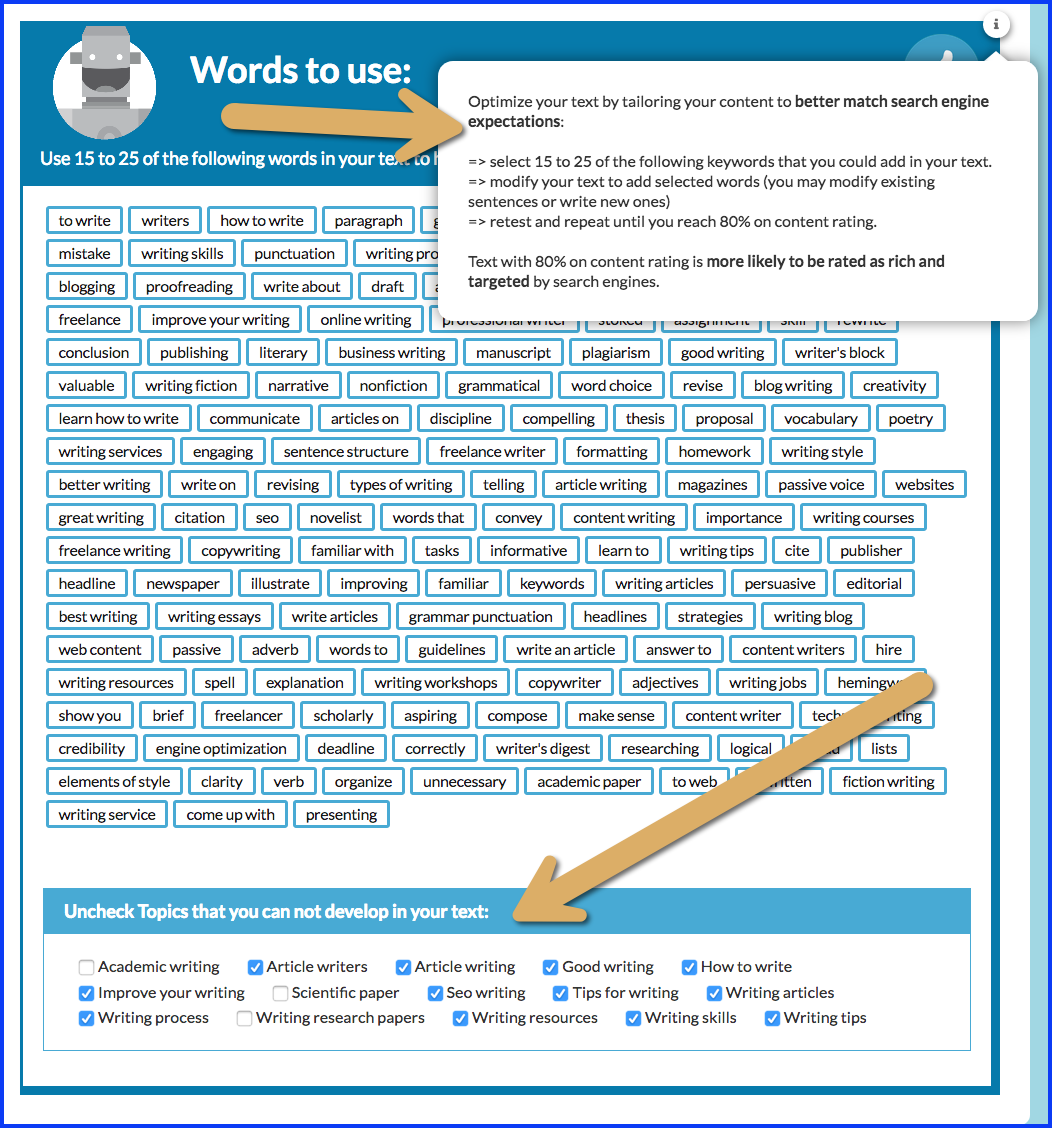
Note those “Topics” the tool has identified by analyzing Google search engine result pages: They are incredibly on-point! I have unchecked “Academic writing” and “Scientific paper” because that’s not what I am writing about and the tool refined the list of suggested terms to be of more help.
The rest of topics are awesome though, so I’ll use most of those for this blog post structure.
How to Write a Good Blog Article Using TextOptimizer?
After running the tool, I have picked the following keywords to include in my article while writing it. My word choice was based purely on my editorial judgment: You don’t have to pick words that would hurt your creativity just too please the tool. Choose those terms that make sense to you and make you feel inspired (“Oh this is a good idea! I can see myself writing about this”)
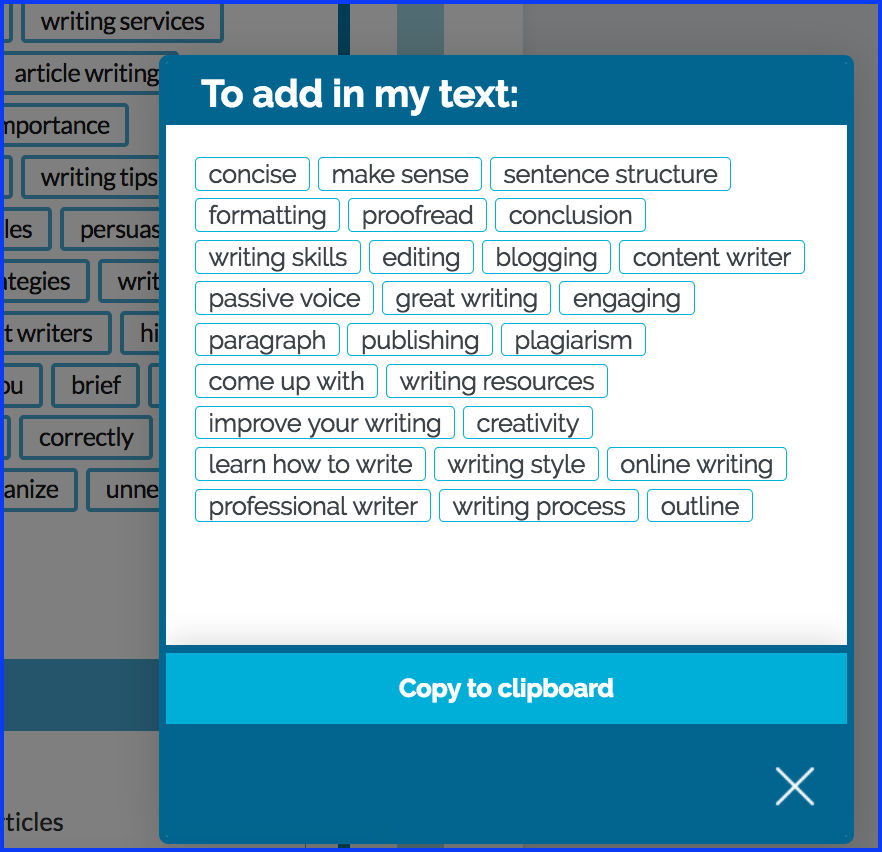
So I sat down and wrote the article, keeping those suggested terms, as well as the main categories (i.e. Topics), in mind.
In this particular case I didn’t need any additional research (apart from using the tool enough for me to feel comfortable to write this review).
Next step is to see how well I did including those related terms and concepts to match my article to match both my readers’ and Google’s expectations.
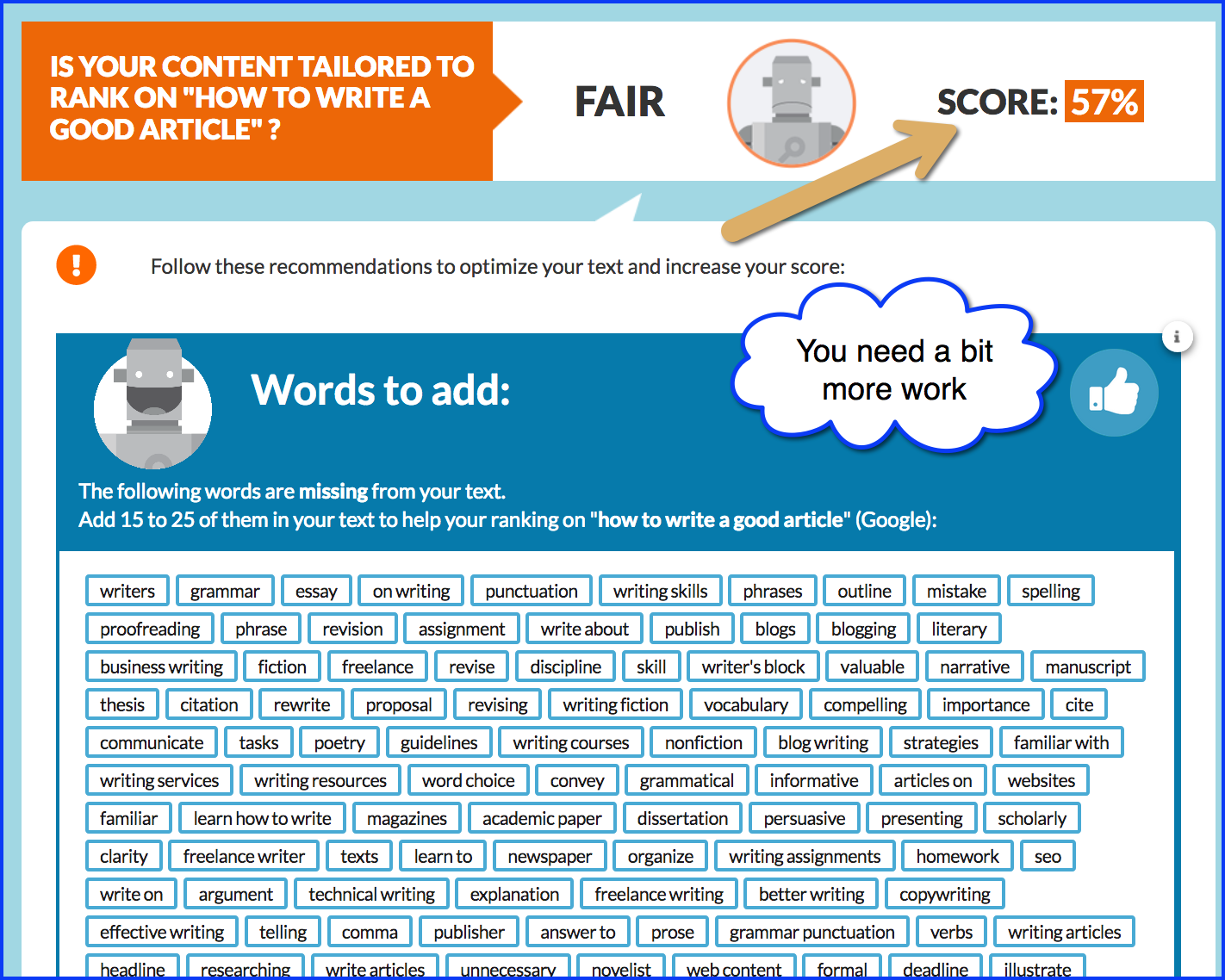
Continue choosing more terms and building well-structured content around them until you score at least 75: this is considered well-optimized thorough content.
Giving You Actual Content Writing Tips
When analyzing your existing content, TextOptimizer will also score your overall content quality (style, readability) and provide helpful tips to improve your writing, i.e.:
- Keep in mind your sentence structure: Build concise sentences and paragraphs.
- Choose active voice over passive voice (i.e. better “I need to write clearly” than “It needs to be written clearly”)
- Learn to organize your content into logical blocks that support one another
- Use straightforward language: Simpler words and simpler word structures. Overall avoid redundancies. It’s all about effective writing.
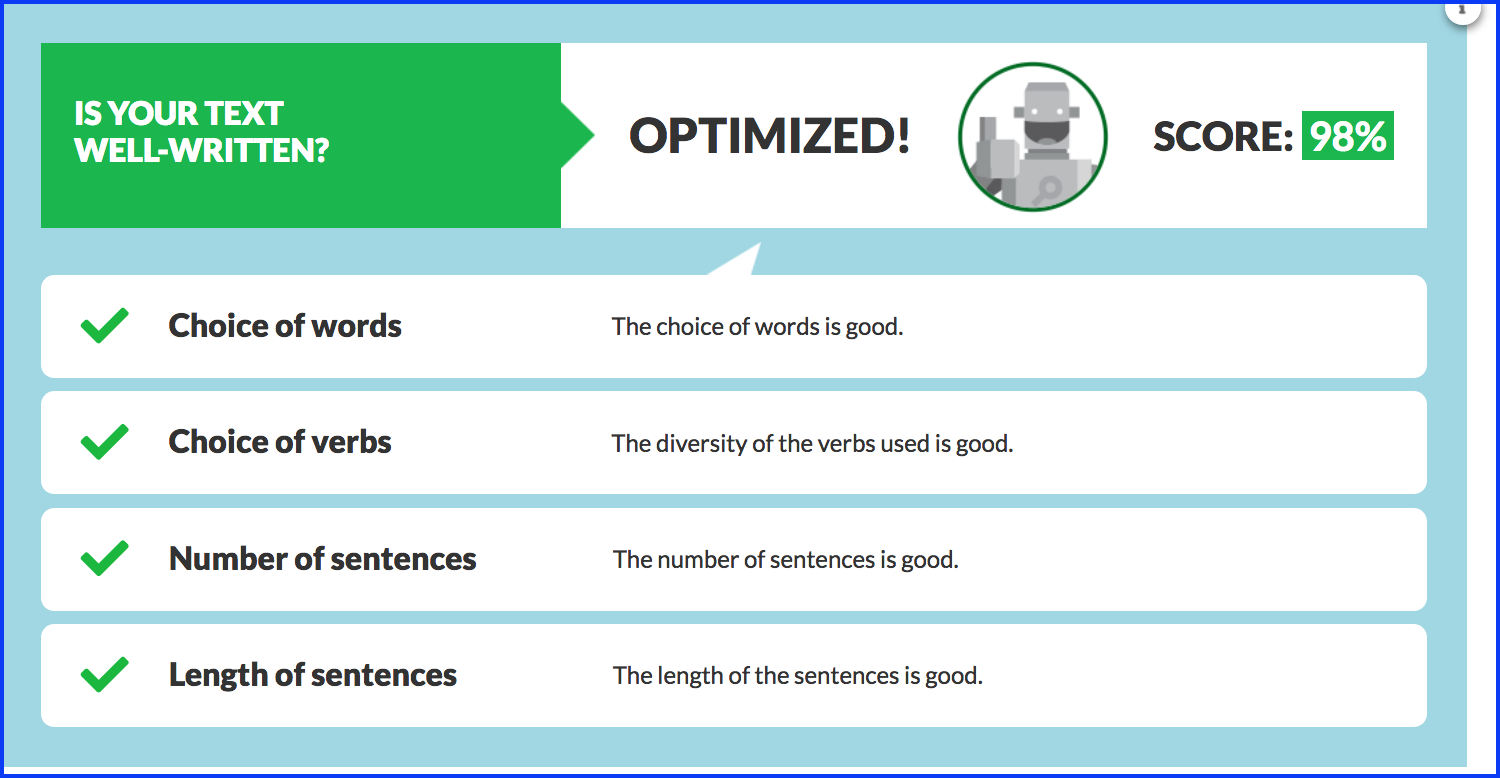
It’s not that you have to change your writing style: It’s about making your content more readable and likable without sacrificing on your own identity.
How to Structure a Good Blog Post?
Online writing is quite different from other types of writing: Most web readers are lurkers and skimmers and you need to keep that in mind when working on your draft.
Break your article into meaningful subsections using TextOptimizer’s Topics and Editorial suggestions:
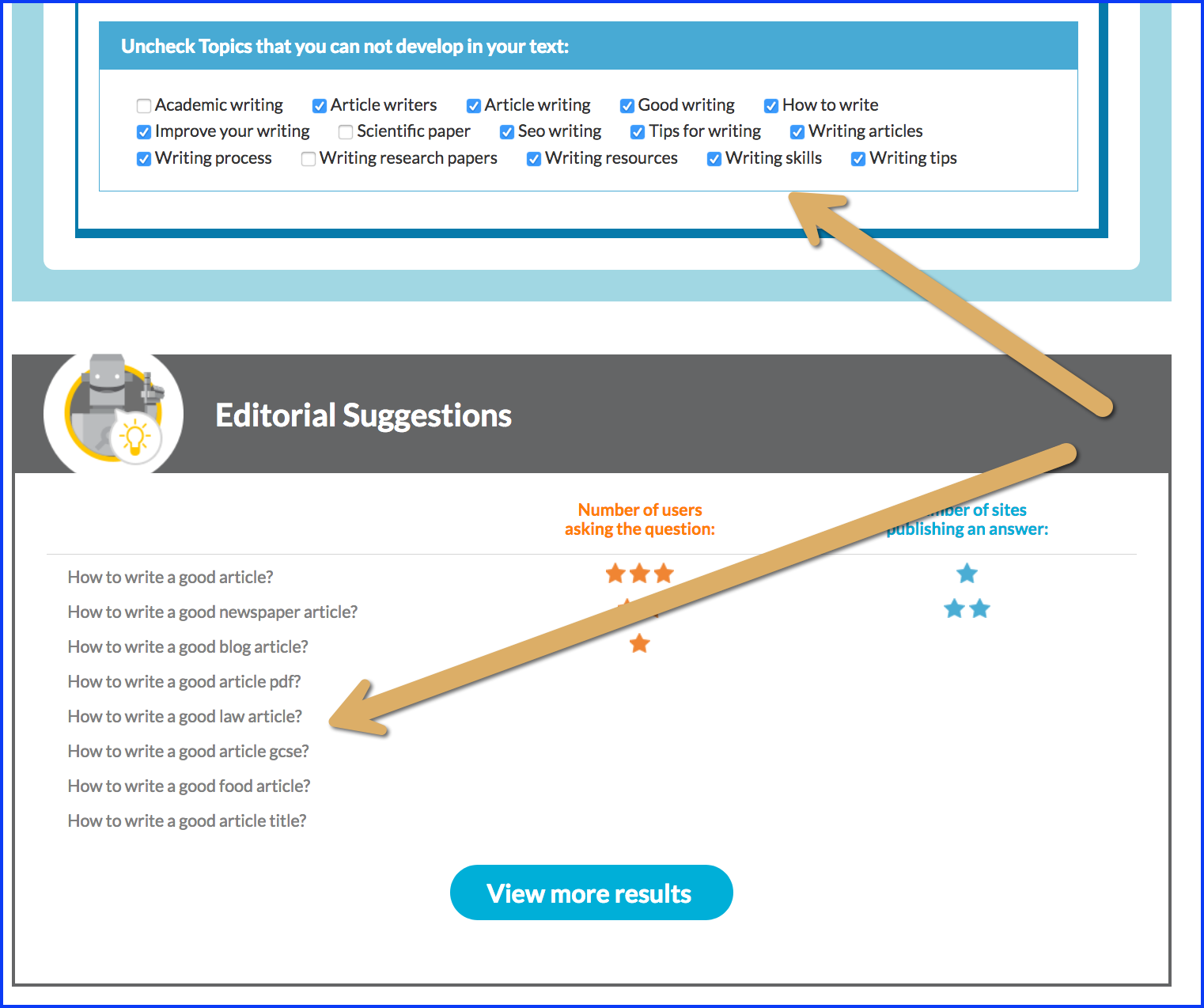
Use H2/H3 subheads to create a well-defined easily-skimmable content structure using Text Optimizer.
When taken out of context, your subheads should give a solid well-defined outline of what it is you write about. In other words, they should summarize your content and make sense even when taken out of context.
Your Writing Process, Streamlined
Now, Text Optimizer is not a magic bullet: You still need to work hard on your content. You still need to spend hours on research, formatting and editing.
You still need to craft a compelling headline. You still need to proofread a multiple times, paragraph by paragraph, until you know your content by heart, before publishing your article.
What it can help you with is to turn your good writing into great writing by forcing you:
- To structure your writing properly
- To choose rich and varied vocabulary
- To research more (based on topics it suggests)
- To improve your writing by including related terms and concepts
- To come up with readable web- and search-friendly content
- To build web content that ranks well driving your whole on-page search engine optimization strategy
Anyone, from a newbie blogger to a professional writer, will find the tool useful for content writing (be it blogs or commercial money-pages). As a nice bonus, if you use the tool to optimize your existing content, you are likely to see from +5 to +10 boost in organic rankings (at least that’s what I’ve seen so far), so using it may make a huge different for your Google organic rankings.
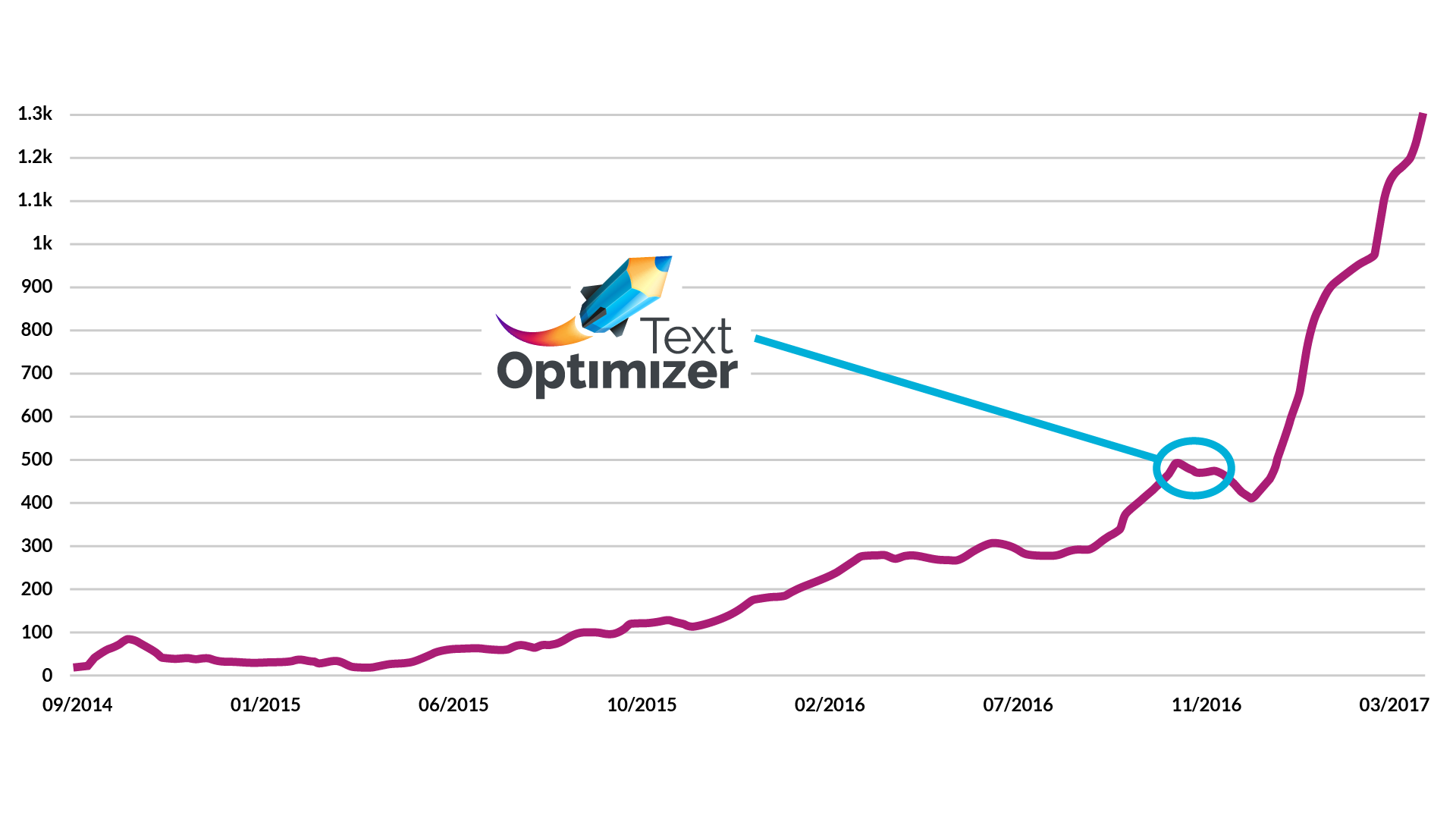
The tool has a web-based version, a WordPress plugin and a Google Chrome extension.
When used properly, Text Optimizer can actually define your whole blog writing strategies improving your writing skills, one article at a time.
Good luck!
- How To Build Traffic Without Relying On Google Rankings - July 4, 2025
- Why I Blog, and Why You (and Your Business) Should Too - September 27, 2024
- How To Promote Your Ebook On Twitter - May 30, 2024
- How to Print Your Social Media Memories - March 7, 2024
- How to Boost Sales with Social Media - August 1, 2023
- 5 Community Building WordPress Plugins - May 16, 2022
- 5 SEO Tips For Blogging And Content Creation - February 21, 2022
- Facebook Video Ads and Your Small Business: 6 Tips to Help You Win New Audiences - November 1, 2021





